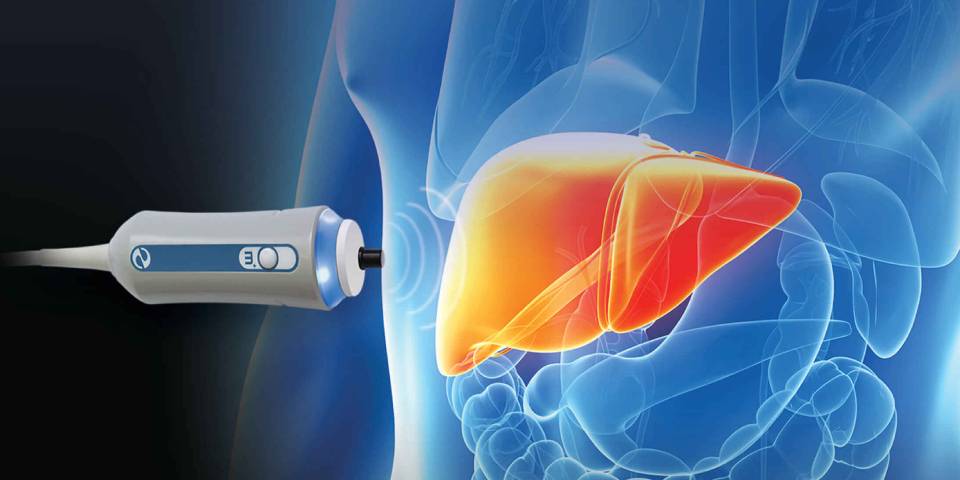
- January 20, 2024
- Dr. Vikrant Kale
- 0 Comments
- Latest Blogs
The Silent Progression: FibroScan’s Key Role in Early Liver Disease Detection
Liver disease is often a silent killer and can advance unseen until it reaches advanced stages, making effective treatment challenging. Conditions such as fibrosis and cirrhosis can silently develop within the liver, leading to severe health complications. However, early detection and intervention are vital for managing liver disease and preventing complications. This is where FibroScan comes in as a revolutionary tool for early liver disease detection.
In this blog, the best liver specialist in Pune, Dr. Vikrant Kale & his team explore the silent but crucial role of FibroScan in identifying liver diseases at their early stages.
What is Fibro Scan?
FibroScan, also known as transient elastography (TE), is a non-invasive, painless test that measures liver stiffness. It uses low-frequency ultrasound waves to assess the elasticity of liver tissue. Healthy liver tissue is elastic, while stiffer tissue indicates the presence of fibrosis, a hallmark of liver disorder.
How Fibro Scan Works?
FibroScan works by using ultrasound waves to calculate the stiffness of the liver tissue. The probe is placed on the skin over the liver, and the ultrasound waves are sent into the liver. The probe then calculates the speed of the waves as they travel through the tissue. Stiffer tissue will cause the waves to travel more gradually.
Why is Early Liver Disease Detection Important?
In early stage liver diseases usually has no symptoms. By the time signs appear, the disease may have already progressed to an advanced stage, making treatment less effective. Early detection allows for intervention before significant damage occurs, improving the chances of successful treatment and preventing complications such as cirrhosis and liver failure.
How Does FibroScan Help in Early Liver Disease Detection?
FibroScan is a quick and easy test that can be performed in Dr. Vikrant Kale’s clinic. It is an effective tool for routine screening and monitoring of people at risk for liver disease since it may produce accurate results in a matter of minutes. Some of the conditions for which FibroScan can be used for early detection include:
- Fatty liver disease: This is a common condition indicated by the buildup of fat in the liver. It can advance to fibrosis and cirrhosis if left untreated.
- Viral hepatitis: Hepatitis B and C are infections that can harm the liver and lead to fibrosis and cirrhosis.
- Alcohol-related liver disease: Excessive alcohol consumption can damage the liver and lead to fibrosis and cirrhosis.
- Non-alcoholic steatohepatitis (NASH): This more severe type of fatty liver disease has the potential to develop into cirrhosis.
The Benefits of FibroScan:
FibroScan offers several benefits over traditional methods, such as liver biopsies, in the diagnosis of liver disease. These include:
- Non-invasive: FibroScan is a non-invasive test, which means that it does not need any needles or incisions. This makes it a much more comfortable and suitable test for patients than a liver biopsy, which is the standard method of diagnosing liver fibrosis.
- Painless: FibroScan is a painless test. Most patients say feeling only a slight vibration during the test.
- Quick and easy: FibroScan is a quick and easy test to perform. It can be done in a point of minutes.
- Accurate: FibroScan is a very accurate test for liver fibrosis. Studies have shown that it is more accurate than other non-invasive tests, such as liver biopsy.
- Safe: The test is safe for most patients, including pregnant women and children.
Who Should Get FibroScan?
FibroScan is recommended for individuals who are at risk for liver disease, such as people with:
- Hepatitis B or C
- Alcohol misuse
- Non-alcoholic fatty liver disease (NAFLD)
- Diabetes
- Obesity
Improving treatment results for liver disease requires early detection. A quick, accurate, and non-invasive test called FibroScan can help identify liver disease early on when it is most curable.
Some additional tips for protecting your liver health:
- Avoid alcohol abuse.
- Maintain a healthy weight.
- Eat a healthy diet.
- Engage in regular exercise.
- Get vaccinated against hepatitis B and C.
By following these tips, you can aid in reducing your risk of developing liver disease.
Conclusion:
FibroScan helps identify liver disease early on. Its non-invasive, painless, and accurate characteristics make it the ideal option for patients who are at risk of liver disease for routine screening and monitoring. Early detection and intervention are crucial for managing liver disease and preventing complications.
Dr. Vikrant Kale, the top gastroenterologist and hepatologist in Pune, can help you get tested for liver disease if you’re worried about the health of your liver. Early detection and intervention can make a big difference in your health outcomes.

